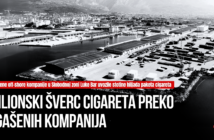Neighbouring countries do not declare information regarding the construction of highways secret
Non-transparency of the Bar-Boljare highway project can be seen on the examples of other countries, especially Croatia and Bulgaria.
Based on the Law on Free Access to Information, MANS has been trying for years to obtain basic information about the highway project in Montenegro worth € 809 million, which is built from the loan by the Chinese Exim Bank, while the contractor is China Road and Bridge Corporation (CRBC) .
Basic information about the highway is secret, on the grounds that it is the intellectual property of the Government, and that it is a business secret that can disrupt the competition.
It is unknown in what way the money from the loan is spent, if deadlines are respected and in what way the control of the highway project is being implemented, as well as almost all other information about the Montenegro’s “business of the century”, especially those related to environmental protection. This particularly applies to documents that would unambiguously indicate who is responsible for devastation of the Tara River, but also how and if all the damage will be remedied.
MANS Investigative Centre, by comparing data published on highways in Croatia and Bulgaria, found that much more information and documentation were published than in Montenegro, especially when it comes to environmental protection.
Thus, for example, Bulgaria included an environmental consultant in the construction of the Struma highway. According to MANS, the consultant worked together with ecologists to provide technical solutions in accordance with environmental standards.
Preparation for the construction of the highway in the south-western part of Bulgaria, from Sofia to Kulata on the Greek-Bulgarian border, was done in three steps. The first was preparation of the preliminary project – to establish optimal harmonization and develop preliminary project of tunnels and road sections. The second step implied consulting services of a strategic consultant who helped with technical, financial, environmental and managerial aspects of the design process.
Finally, the third step was the engagement of an environmental adviser.
Bulgaria, member of the EU, has a financial support of the European Cohesion Fund (480 million) for the 150 km long highway, estimated at €600 million.
The construction is divided into four sections, three of which are completed. Completion of the fourth section is expected by 2023.
Details of this project can be found on European and Bulgarian websites.
A government report was also published regarding the Recommendation of the Standing Committee on the Convention on the Protection of European Wildlife and Natural Habitats, as well as all reports, tenders, decisions and contracts for the highway.
“When constructing a section through protected area, experts took into account a significant number of opinions and objections that were provided during the environmental impact assessment on alternative routes, as well as results of public hearings and reports by independent experts.
Part of the highway must pass through the protected Kresna Gorge, which is the habitat of many endangered species. NGOs, having access to the data, expressed concern over petitions, protests and studies, insisting that the highway bypassed the gorge in order to avoid further harmful effects on wildlife and their habitats.”
The government approved a 15-kilometer-long tunnel for a visit to the gorge, but it was cancelled, and other alternative options appeared as well.
The construction of a section of the Zagreb-Sisak highway, from Jakuševac to Velika Gorica, was most criticized by the Croatian public because of the price. The construction of a 10.9-kilometer-long section cost, according to the Croatian media, “incredible €20 million” per kilometre.
It took 9 years to build the section and it opened in November 2015. Works were officially launched in 2006 in the presence of the then Prime Minister Ivo Sanader. The plan was to complete the works by 2009. Although there are no tunnels on the section and the route passes through the flat land, in the end, according to the Croatian media, the section cost significantly more than the more demanding Dalmatina and more than double the construction of an average, undemanding highway in Europe.
According to the official data, the average price of a kilometre of the entire Zagreb-Split highway is just over €4 million, and the average price from Zagreb to Sisak € 11.3 million, according to MANS.
A kilometre of the Montenegrin section of the highway from Podgorica to Kolašin costs, for now, around €20 million. However, due to the forgotten bypass and all the accompanying works, as well as the possible costs of the Tara rehabilitation, the section will cost more than one billion Euros.
There was no criticism in Croatia regarding the transparency of the project to build a section from Jakuševac to Velika Gorica, although it is the most expensive one.



